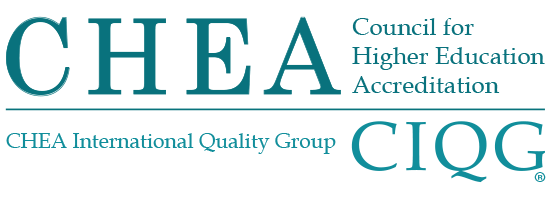CONTACTS

Our address:
20 Dostyk Street, Business Center "Saint Petersburg", office 801,
Astana, Z05H9M7, Republic of Kazakhstan
Phone / fax: +7 (7172) 27-38-20
E-mail: This email address is being protected from spambots. You need JavaScript enabled to view it.
Secretariat: +7 (7172) 27-38-20 E-mail: This email address is being protected from spambots. You need JavaScript enabled to view it.
Accountant: +7 (7172) 27-38-21 E-mail: This email address is being protected from spambots. You need JavaScript enabled to view it.
Jurist: +7 (7172) 27-24-90 E-mail: This email address is being protected from spambots. You need JavaScript enabled to view it.
INTERNATIONAL DOCUMENTS
The standards and guidelines for Quality Assurance in the European Higher Education Area (ESG) were adopted by the Ministers of Education in 2005 following a proposal prepared by the European Association for Quality Assurance in Higher Education (ENQA) in cooperation with the European Union of Students (ESU), the European Association of Higher Education Institutions (EURASHE) and the European Association of Universities (EUA).
Since 2005, significant progress has been made in the area of quality assurance, as well as in other areas of the Bologna Process.
In response to this change in context, the 2012 ministerial communique called on the E4 Group (ENQA, ESU, EUA, EURASHE), in collaboration with international education organizations, Business Europe and the European Register for Quality Assurance in Higher Education (EQAR), to draft a revised ESG "with a view to improving their clarity, applicability and usefulness, including the scope of application".
The development of the new version of the ESG included several rounds of consultations involving both key stakeholders and ministries. All comments, suggestions and recommendations received were carefully reviewed and taken into account by the Steering Group (WG). They are reflected in the final version of the standards and guidelines for quality assurance in the EHEA (ESG). The new ESG standards were adopted at the 2015 Conference of Ministers of Higher Education in Yerevan, Armenia.
The original new ESG 2015 document is available at the website ENQA and presented below: ENQA 2015 Standards and Guidelines
ECTS (European Credit Transfer and Accumulation System) was introduced in 1989 as part of the Erasmus program as a way to transfer loans received by students abroad upon their return to their original higher education institutions. Currently, this system plays an additional role in the accumulation of loans, the development, description and implementation of programs, facilitating the mobility of students within different countries through the process of recognizing loans and study periods. The ECTS Usage Guide provides recommendations for implementing ECTS and links to useful supporting documents.
The 2009 ECTS Guidelines were revised by the Bologna Process Working Group (BFUG) on 27-28 November 2014 in Rome and were approved at the May 2015 Ministerial Conference in Yerevan, Armenia. This revised version is based on the work carried out in recent years, developed in the countries of the Bologna Process, and in the individual countries. This was done to help the academic community and other stakeholders in the higher education move towards the changes promoted by the Bologna Process.
The revised guidelines take into account recent developments in the Bologna process, such as the creation of the European Higher Education Area (EHEA), the consolidation of continuing education, the paradigm shift from the teacher-centered to student-centered higher education, the increasing use of the concept of learning outcomes, and the development of new forms of learning and teaching.
This information is taken from the official ECTS User Guide.
More information about the European Credit Transfer and Accumulation System (ECTS) is available on the official website of the European Commission.
INQAAHE Good Practice Guide (International Network of Quality Assurance Agencies in Higher Education) is intended for use in the work of all quality assurance agencies, regardless of their stage of development. The original INQAAHE Good Practice Guide was published in 2003 and revised in 2006. The new version of the INQAAHE Good Practice Guide reflects the experience of institutions, programmes and experts who used the 2003 version. It is designed to continue the process of continuous improvement of INQAAHE.
The purpose of the Good Practice Guide is to promote good practices for internal and / or external quality assurance. Specific goals include:
- creating a framework for guiding the creation of new external quality assurance agencies (EQAAs);
- providing criteria for use in self-assessment and external evaluation of external quality assurance agencies;
- promotion of professional development among external quality assurance agencies and their employees;
- promoting public accountability of external quality assurance agencies.
This information is taken from the official INQAAHE Good Practice Guidelines.
More information about the INQAAHE Good Practice Guide is available on the official INQAAHE website.
Lisbon Recognition Convention (The Convention on the Recognition of Qualifications Relating to Higher Education in the European Region) was developed by the Council of Europe and UNESCO and adopted by the national representatives in Lisbon on 11 April 1997. It provides for the creation of a coherent and consistent framework for the recognition of relevant qualifications in the higher education system. The purpose of creating this document is to ensure that the qualifications of a signatory from one country can be recognized in another country.
The basic principles of the Lisbon Recognition Convention are presented below:
- Holders of qualifications issued in one country should have adequate access to the assessment of these qualifications in another country.
- Each country must recognize qualifications issued by other countries that meet the general requirements for access to higher education, in order to access the programs that make up its higher education system, unless it can be proved that there are significant differences between the general requirements and the qualifications for which recognition of this qualification is requested.
Recognition of a higher education qualification issued in another country must entail one or more of the following consequences:
- access to further education in higher education, including relevant examinations, and / or to the training in degree programmes, under conditions similar to those applicable to the holders of candidate qualifications in the country in which recognition is sought;
- use of the degree in accordance with the laws and regulations of the country in which recognition is sought;
- in addition, recognition can facilitate access to the labor market.
This information is taken from the official document of the Lisbon Convention on Recognition.
More information about the Lisbon Recognition Convention is available on the official website of the Council of Europe.
REGULATORY AND LEGAL DOCUMENTS OF THE REPUBLIC OF KAZAKHSTAN
Education is recognized as one of the most important priorities of the long-term Strategy "Kazakhstan-2050". The overall goal of educational reforms in Kazakhstan is to adapt the education system to the new socio-economic environment. The President of Kazakhstan also set the task of making the republic one of the 30 most competitive countries in the world. Improving the education system plays an important role in achieving this goal.
The organizational basis for the implementation of the state policy of the Republic of Kazakhstan in the field of education is the State Program for the Development of Education of the Republic of Kazakhstan, which provides the state policy and modernization of Kazakhstan's education.
The program is a complex of interrelated activities in terms of resources and terms, covering changes in the structure, content and technologies of education and upbringing, the management system, the organizational and legal forms of the subjects of educational activity and financial and economic mechanisms.
ADDITIONAL EDUCATION
Additional professional education is aimed at meeting the educational needs throughout life in order to obtain an additional amount of knowledge and skills in accordance with the ongoing socio-economic changes in society.
Additional adult education is provided by the educational organizations, as well as the legal entities that have structural divisions that implement additional educational programs.
In the process of institutional accreditation, the quality of education and the scientific activity of the educational institution is evaluated. The IQAA standards and criteria for institutional accreditation are developed in accordance with the Standards and Guidelines for Quality Assurance in the European Higher Education Area (ESG) and are intended for the internal quality assurance of the educational institution.
Through accreditation, the educational institution has the opportunity to receive an independent expert assessment and measures to further improve its activities.
The accreditation procedure of the educational program is carried out by independent international and national experts in accordance with the Standards and criteria of the IQAA program accreditation and covers all aspects of the educational program.
After receiving accreditation, the Agency annually conducts post-accreditation monitoring (PAM). Educational institutions must submit an annual report to IQAA on the changes and achievements that have occurred during the year in order to carry out continuous monitoring of activities and periodic evaluation of educational programs. Periodically and selectively, monitoring is carried out with a visit directly to the educational organization. All procedures for post-accreditation monitoring are prescribed in the Regulations on Post-accreditation Monitoring.
Thus, by promoting high quality in education, the Agency provides an opportunity for educational organizations to eliminate the identified inconsistencies and improve their activities.
EXPERTS
In the external assessment of the quality of educational institutions or their educational programs, the determining role belongs to the experts, who have extensive experience in professional fields and contribute to the work of the Agency. Experts are specialists with an academic degree who understand the essence of the phenomenon being evaluated. The expert evaluation mechanism focuses on internal quality indicators and is based on the principles of integrity of the self-managed academic community. In addition to local experts, each accreditation includes an international expert, who is called upon to provide an outside view and evaluate the educational organization or its program from an international perspective.
From the very beginning of its activity, IQAA has always involved students, employers, and international experts in all external audits, which allows all interested parties to participate in quality assurance procedures, as well as to learn from international experience.
IQAA focuses on training and systematically improving the skills of its external experts through training seminars, conferences, and the development of training materials.
The "Experts" tab is created specifically for external experts of the Agency, as well as potential persons wishing to become IQAA experts among national experts, international experts, representatives of employers, and students. The information and materials presented in this section serve as the basis for the effective work and self-development of external IQAA experts. Information for experts is constantly updated and improved in accordance with new trends in the field of quality assurance.
ACCREDITATION OF HIGHER AND POSTGRADUATE EDUCATION
The IQAA accreditation standards are developed in accordance with the Standards and Guidelines for Quality Assurance in the European Higher Education Area (ESG) and are intended for internal quality assurance of educational institutions. The accreditation procedure also takes into account state regulatory documents and international standards.
The IQAA accreditation procedure consists of 4 stages:

- submission by the educational organization of an application for accreditation to the Agency with a brief description of the organization's activities and copies of the general license;
- signing of an accreditation agreement between IQAA and the educational organization. The contract specifies the rights and obligations of the parties, the cost of the procedure, the terms of accreditation, including the stages of the process. In the case of state organizations, it is possible to sign the contract only after conducting the public procurement procedure on the electronic portal;
- appointment of a coordinator, preliminary visit to the organization, if the Agency is working with him for the first time;
- conducting training seminars for the organization's working groups on the preparation of the self-assessment report and the implementation of the accreditation procedure;
- conducting a self-assessment procedure by an educational institution, compiling a self-assessment report in accordance with IQAA standards and criteria;
- submission of the first version of the self-assessment report and technical expertise. The results of the examination are sent to the university, if necessary, the self-assessment report is finalized by the educational organization;
- submission of the final self-assessment report and its annexes to the Agency;
- preliminary audit during institutional accreditation.

- IQAA forms a competent group of experts (auditors), which includes representatives of educational institutions of Kazakhstan, an employer, a student and an international expert;
- the group is formed in parallel during the examination of the self-assessment report;
- the agency informs the educational institution about the composition of the external audit group. If the educational organization suspects a conflict of interest among any of the auditors, the organization has the right to apply to the Agency to replace the expert (auditor), attaching a written reasoned explanation;
- the coordinator sends the self-assessment materials and methodological support several weeks in advance to the members of the expert group to prepare for the external audit;
- the coordinator conducts a preliminary webinar for the expert group in order to train experts and discuss organizational audit issues, and immediately before the start of the visit to the educational institution - a briefing;
- external audit to the educational organization (3 days). An external audit is conducted to assess the reliability of the information provided in the self-assessment report, the actual state of affairs in the organization;
- the expert group generates an external evaluation report (with comments, recommendations for improvement, and good practices), which is sent to the coordinator;
- the IQAA coordinator sends the received report of the expert group on the evaluation of the organization's activities to the educational organization to eliminate factual inaccuracies, if any;
- if necessary, the complaint procedure is available to educational institutions.
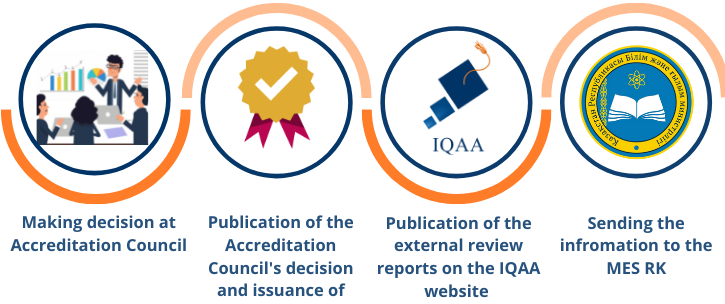
- the Department for checking the reports of the EEG and PAM, together with the expert council, checks and edits the external audit report and forms an accreditation conclusion for the Accreditation Council;
- based on the self-assessment report, the external audit report and the conclusion, the Agency coordinator prepares a presentation for the Accreditation Council;
- holding a meeting of the IQAA Accreditation Council and making a decision on the accreditation of the educational institution. The Accreditation Council independently makes decisions based on the self-assessment report and the external audit report, presentation and conclusion. However, taking into account the opinions of the members of the Accreditation Council, additional information and evidence base for the educational institution, the assessment may be changed;
- informing the educational institution and the members of the expert group that conducted the external audit about the decision on accreditation;
- if necessary, the appeal procedure is available to universities;
- publication of the external audit report and accreditation results on the Agency's website. Inclusion of an accredited educational organization in the IQAA register on the website "Register of Decisions and Reports";
- publication of the external audit report in the DEQAR database;
- sending information to the Ministry of Education and Science of the Republic of Kazakhstan for inclusion of an accredited university in the relevant National Register.
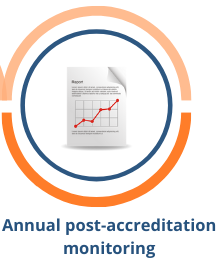
- Implementation of regular post-accreditation monitoring by the Agency.
HIGHER EDUCATION QUALITY ASSURANCE IN KAZAKHSTAN
Since 2011, thanks to the reforms undertaken in the field of quality assessment of higher education, the role of accreditation as one of the main tools for improving the quality of educational services has been significantly strengthened. According to Article 9-1 of the "Law on Education" of the Republic of Kazakhstan, accreditation is carried out voluntarily by non-profit non-governmental organizations. The educational organization independently selects the accreditation body. The State reserves the right to regulate accreditation providers by recognizing and including them in the National Register of Accredited Bodies.
National and international accreditation agencies in Kazakhstan are guided by the Standards and Guidelines in the field of quality assurance of higher education in the European Area (ESG — European Standards and Guidelines), approved by the largest European association for quality assurance of higher Education - ENQA (European Association for Quality Assurance in Higher Education).
Harmonization of external and internal quality assessment procedures with international and European standards, as well as membership of accreditation bodies in ENQA – the way to the recognition of the Kazakh education system at the European level.
HIGHER EDUCATION IN KAZAKHSTAN
According to the Bureau of National Statistics of the Agency for Strategic Planning and Reforms of the Republic of Kazakhstan, at the beginning of the 2023-2024 academic year in the Republic of Kazakhstan, the number of operating higher education institutions amounted to 112 organizations, including 77 universities, including research, 14 academies, 10 institutes, and equivalent conservatories, higher schools and higher schools, 8 national higher education institutions educational institutions, 3 national research universities.
Over the years of independence, the state has implemented large-scale reforms in the higher education system to improve the quality of specialist training. In 2010, Kazakhstan became a participant in the Bologna process; qualification requirements for licensing higher education institutions were strengthened; a ban on the activities of university branches was introduced; in 2018, legislative changes were made to expand the academic and managerial independence of universities; 27 state universities were transformed into non-profit joint-stock companies; and the League of Academic Integrity was established as an independent organization with On January 1, 2019, distance learning was canceled, and in recent years, the rules for admission to universities for grants have been strengthened.
At the beginning of the 2023-2024 academic year, the total number of students at universities amounted to 635,157 people, of whom 592700 were enrolled in bachelor's degree programs, 36491 in master's degree programs, and 5966 in doctoral programs.
The total number of teaching staff at the beginning of 2022-2023 amounted to 36.4 thousand teachers, of whom masters made up 39%, candidates of sciences - 29%, associate professors - 13%, doctors of philosophy (PhD) - 10%, doctors of sciences - 7%, professors - 6% and doctors in the profile - 1%.
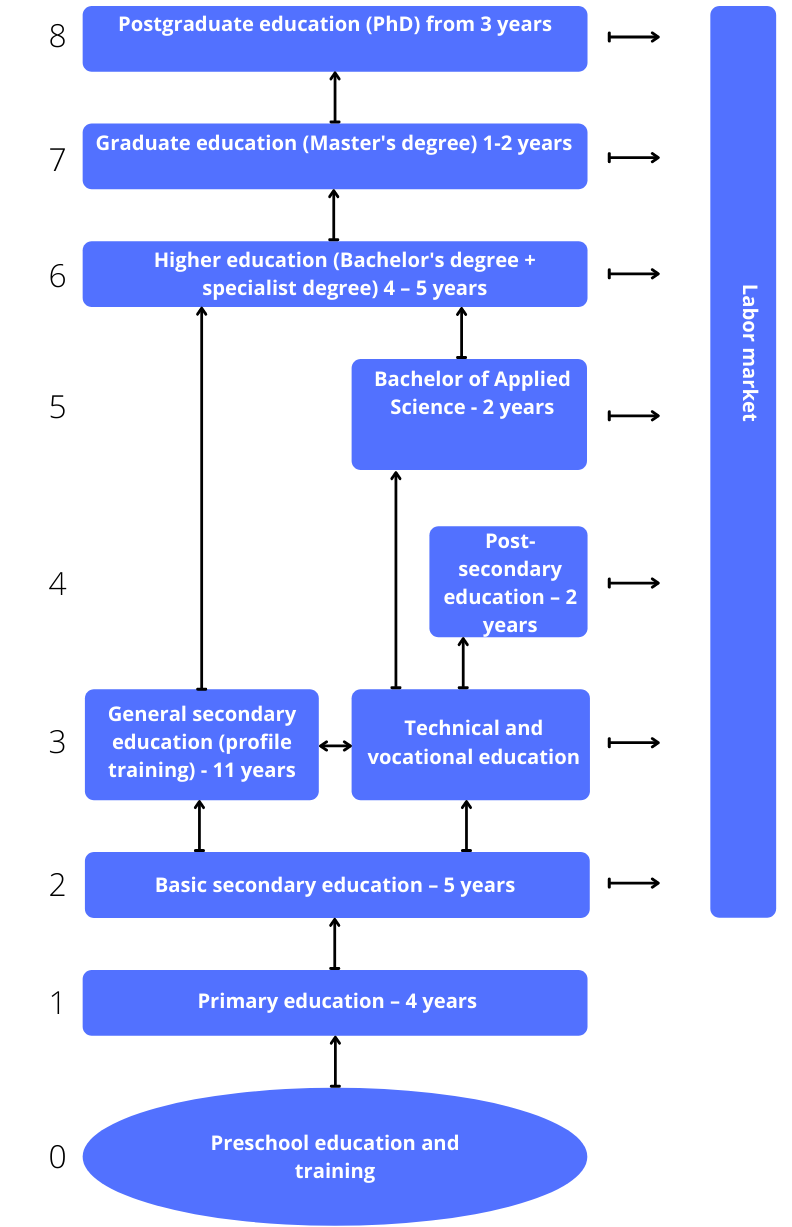
The education system of the Republic of Kazakhstan is characterized by multilevel and continuous development and includes the following levels of education:
- 0. Preschool education and training – 1/6 years
- 1. Primary education (4 years); entry - 6/7 years.
- 2. Basic secondary education; entry - 10/11 years.
- 3. Secondary education; entry - 15/16 years.
- - general secondary education;
- - technical and professional education: qualifications of a worker and a mid-level specialist, entry - 15/16 years;
- 4. Post-secondary education: qualifications of a worker with a high level of discharge; entry - 17/18 years.
- 5. Incomplete higher education – applied bachelor's degree; admission - 17/18 years.
- 6. Higher education: bachelor's degree, specialist qualifications for medical specialties; admission – 17/18 years.
- 7-8. Postgraduate education: Master's and PhD degrees.
The structure of higher and postgraduate education of the Republic of Kazakhstan is regulated by the Law "On Education" (dated July 27, 2007). With the signing of the Bologna Declaration in 2010, Kazakhstan is implementing a three-level system of higher education "Bachelor-Master- Ph.D.". This structure has found its legal consolidation in the Law of the Republic of Kazakhstan "On Education»:
1) Higher basic education – bachelor's degree program - with a duration of 4 years;
2) Postgraduate education, including the scientific and pedagogical direction of training-the master's program-with the duration of training in the profile master's program – 1 year, in the scientific and pedagogical – 2 years;
3) The program of preparation of doctors of philosophy (PhD), doctors in the profile-doctoral studies-after completion of master's programs. The duration of training is at least 3 years or more.
According to the Bologna Declaration, the introduction of a system of credits or credits ensures the recognition of educational programs. The introduction of credit technology of training is a significant contribution to the recognition of national educational programs at the international level, ensuring the mobility of students and teachers, as well as improving the quality of education and ensuring the continuity of all levels and stages of higher and postgraduate education. Consequently, all universities in the country use the Kazakhstan credit transfer model, developed according to the ECTS type. ECTS (European Credit Transfer and Accumulation System) is a universal system for measuring the academic load of a student during the development of an educational program or a separate course.
Admission to higher educational institutions of the Republic of Kazakhstan is carried out by the Standard Rules for admission to educational organizations implementing professional training programs of higher and postgraduate education, approved by order of the Minister of Education and Science of the Republic of Kazakhstan dated October 31, 2018. Persons with general secondary, technical vocational, post-secondary, and higher education are accepted to universities.
Admission to universities is carried out according to the results of passing the Unified National Testing (UNT) based on a state educational order or a paid basis.
According to the Rules of the unified national testing and the provision of public services "Issuance of a certificate of passing the unified national testing", graduates can take the UNT 5 times. Applicants who have passed the UNT from May to July can participate in the competition for a state educational grant award.
In March 2010, Kazakhstan officially joined the Bologna Declaration and became the 47th member of the European Higher Education Area and the first Central Asian state to be recognized as a full member of the European Educational Area.
The transition to a multi-level training model in accordance with the Bologna Process is fully completed. According to the National Report on the State and Development of the Education System of the Republic of Kazakhstan (based on the results of 2019), undergraduates are trained in 118 universities of the country, where 32,527 people study, of which 16,220 study at the expense of the state order. The graduation rate of undergraduates with a defense is 92%. Currently, the system of higher education in Kazakhstan, which has implemented the American-style credit system, is changing, as the European Credit Transfer and Accumulation System (ECTS), the pan-European system of accounting for students' academic work during the development of an educational program or course, is being introduced. The new ECTS Guidelines approved at the Yerevan Conference of European Ministers of Education on May 14-15, 2015 are being implemented. In recent years, the academic mobility of teaching staff and students has been actively developing. Exchange programs are financed from the state budget and the universities' own funds.
The COVID-19 pandemic has made significant adjustments to the educational process. All universities in the country were forced to switch to an online learning format in order to adapt to the new reality. Although the pandemic has had the greatest impact on higher education on a global scale, it is worth noting that it has become one of the few areas in Kazakhstan prepared to transfer its processes to a distance format.
Since March 16, 2020, 116 universities of the country have switched to distance learning. The vast majority of students studied at home, but 5 thousand Kazakh students and 4 thousand foreign students remained in the dormitories at the place of study, as the conditions for distance learning were created in the dormitories.
The country's universities have already had some experience in implementing distance learning technologies in the learning process, as some universities used a mixed form of education, while others used a distance-learning format. Universities use special platforms, such as ZOOM, Platonus, Moodle, Microsoft Teams, Cisco Webex, and others. A number of universities use self-developed platforms. In the difficult situation of the pandemic, universities supported their employees and teaching staff in organizing training courses. All universities and colleges have HelpDesk, a system that provides technical support to students and teachers. Regular surveys of students, faculty, and staff on satisfaction are conducted to obtain up-to-date information and improve the educational process.
PRESCHOOL AND SECONDARY EDUCATION ACCREDITATION
Accreditation of educational organizations is a procedure of recognition by the accreditation body of conformity of educational services to the established standards (regulations) of accreditation in order to provide objective information on their quality and to confirm the availability of effective mechanisms for its improvement (subparagraph 16 of Article 1 of the Law of the Republic of Kazakhstan ‘On Education’).
1. Providing a mechanism for ensuring the quality and effectiveness of the educational process in preschool and secondary education organizations.
2. Stimulating the activities of the organization in the direction of improving the quality of preschool and secondary education and upbringing.
3. Providing a real opportunity for parents of preschool and secondary education children to choose an individual educational route for their child from a wide range of high-quality educational services.
- Procedure for accreditation of preschool and secondary education organizations is carried out voluntarily;
- Focus on improving the quality of preschool education and upbringing;
- Integrity and transparency: internal and external evaluations are conducted fairly and transparently, and information is made available to all participants in the ongoing accreditation process;
- Objectivity and independence: internal and external evaluation is conducted objectively, independently of third parties;
- Responsibility of educational organizations: the primary responsibility for the quality of education and upbringing is assigned to the preschool and secondary education organizations;
- Quality assurance takes into account the needs of children, all other stakeholders, and society as a whole.
More...
ACCREDITATION OF TECHNICAL AND VOCATIONAL EDUCATION
The institutional and program accreditation procedures are developed by the Agency under European and international standards, which include the following stages:

• submission by the college of an application for accreditation to the Agency with copies of the general license and licenses for educational programs;
• conclusion of an accreditation agreement between IQAA and the educational organization;
• appointment of a coordinator, conducting a training workshop for the college working group on the preparation of the self-assessment report;
• establishment of an internal quality assurance system by the educational institution, preparation of a self-assessment report in accordance with IQAA standards and criteria;
• submission of the first version of the self-assessment report and technical review of the IQAA self-assessment report. The results of the technical expertise are sent to the TVET organization, and if necessary, the self-assessment report is finalized by the educational organization;
• submission of the final self-assessment report and its annexes to the Agency.

• the IQAA forms a competent group of experts (auditors), which includes representatives of educational institutions of Kazakhstan, the employer and the student; the group is formed in parallel during the technical analysis of the self-assessment report;
• the Agency informs the educational organization about the composition of the expert group on external audit. If the TVET organization suspects a conflict of interest among any of the auditors, they have the right to apply to the Agency to replace the expert (auditor), attaching a written reasoned explanation;
• the coordinator sends the self-assessment materials and methodological support several weeks in advance to the members of the expert group to prepare for the external audit;
• the coordinator conducts a preliminary webinar for the expert group to train experts and discuss organizational audit issues, and a briefing before the visit to the educational organization;
• the external audit to the educational organization (3 days for institutional accreditation, 2 days for one cluster of educational programs for program accreditation) is organized. An external audit is conducted to assess the reliability of the information provided in the self-assessment report, the actual state of affairs in the educational organization;
• the expert group generates an external evaluation report (with comments and recommendations) according to the approved template, which is sent to the coordinator;
• the IQAA coordinator sends the received report of the expert group on the assessment of the activities of the TVET organization to the educational organization to eliminate factual inaccuracies, if any;
• the TVET organizations may have access to a complaint procedure, if necessary.

• basing on the self-assessment report and the external audit report, the Agency coordinator prepares an opinion, which is approved by the Expert Council, and a presentation for the Accreditation Council;
• holding a meeting of the IQAA Accreditation Council and making a decision on the accreditation of the TVET organization or educational program. The Accreditation Council independently makes decisions based on the self-assessment report and the external audit report, presentation, and conclusion. However, taking into account the views of the members of the Accreditation Board, additional information about the specific program, and the evidence base for the organization of TVET, the assessment may be changed
• informing the TVET organization and the members of the expert group that conducted the external audit about the decision on accreditation;
• having access to the appeal procedure by the TVET organizations if necessary publishing;
• publishing of the external audit report, presentation, and accreditation results on the Agency's website. Inclusion of an accredited TVET organization /educational program in the IQAA register on the website in the tabs "Register of decisions and reports of TVET organizations";
• sending information to the Ministry of Education and Science of the Republic of Kazakhstan for inclusion of an accredited TVET / educational program organization in the relevant National Register.

• Implementation of regular post-accreditation monitoring by the Agency.
DEAR PROSPECTIVE STUDENTS AND THEIR PARENTS
Our agency is a nonprofit organization established to improve the quality of education and competitiveness of Kazakhstani educational institutions; to provide information to stakeholders in Kazakhstan and abroad regarding the excellence of particular educational organizations.
IQAA is included in the National Register of the authorized body (Order No. 304 of the Ministry of Education and Science of the Republic of Kazakhstan dated June 27, 2012) and has certificate No. 001. According to Order No. 112 of the Ministry of Education and Science of the Republic of Kazakhstan dated March 14, 2017, IQAA re-entered Register 1, extending its term by another five years.

In specific, accreditation is a process by which a governmental or non-governmental body evaluates the quality of an educational organization as a whole or a specific study program to formally recognize that it has met certain pre‐determined minimal criteria or standards. The result of this process is usually the awarding of a status (yes/no decision) of recognition, and sometimes of a license to operate within a time‐limited validity.
Thus, we officially recognize the quality of accredited educational institutions and study programs, and we want you to be confident in the choice of your educational organization. To do this, on our official website you can find a Register accredited by IQAA higher education institutions, TVET organizations, and study programs. In addition, you can also analyze external review reports on specific educational organizations and study programs. If you need some external review reports, which are not published on the website, you can send a request for a specific report and we will be happy to provide you this information if it is possible.
We also want to pay your attention to the fact that passing accreditation by educational organizations is not the final point in the process of quality assurance of this organization. After receiving the status on accreditation (accredited for 5 or 2 years), IQAA conducts post-accreditation monitoring, in the course of which the agency controls the process of implementing the recommendations on improvement of the activities carried out by these educational organizations.
Our agency strives to hold an open and active dialogue with stakeholders, especially students and their parents.
Join our official pages on Facebook, Twitter, and YouTube and be aware of activities carried out by our agency and accredited by IQAA educational institutions and study programs.
Your trust and cooperation are very important to us!
A GUIDE FOR STUDENT EXPERTS
The guide for student experts participating in the procedures of institutional and specialized (program) accreditation is designed to instruct students in the field of quality assurance of higher education, on the procedures and standards of accreditation of the Independent Agency for Quality Assurance in Education (IQAA). It aims to clarify the role of students in their participation in the external audit. Moreover, the guide is aimed at familiarizing and studying the procedure and standards of external quality assessment of universities by students involved in the IQAA accreditation procedures.
When developing the guide, the experience of the European Union of Students on the QUEST project was used. The QUEST project was created to expand and support student participation in quality assurance processes. The project was funded by the EU's Lifelong Learning Program, which includes the Agency for Increasing Student Participation in Quality Processes in Scotland (Sparqs), the Romanian Agency for Quality Assurance in Higher Education, and the Free Association of Local Student Bodies in Germany (fzs).



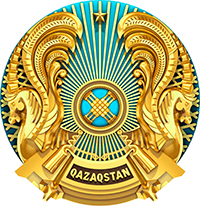 Ministry of Science and Higher Education of the Republic of Kazakhstan
Ministry of Science and Higher Education of the Republic of Kazakhstan 


 Ministry of Education and Science of the Kyrgyz Republic
Ministry of Education and Science of the Kyrgyz Republic



